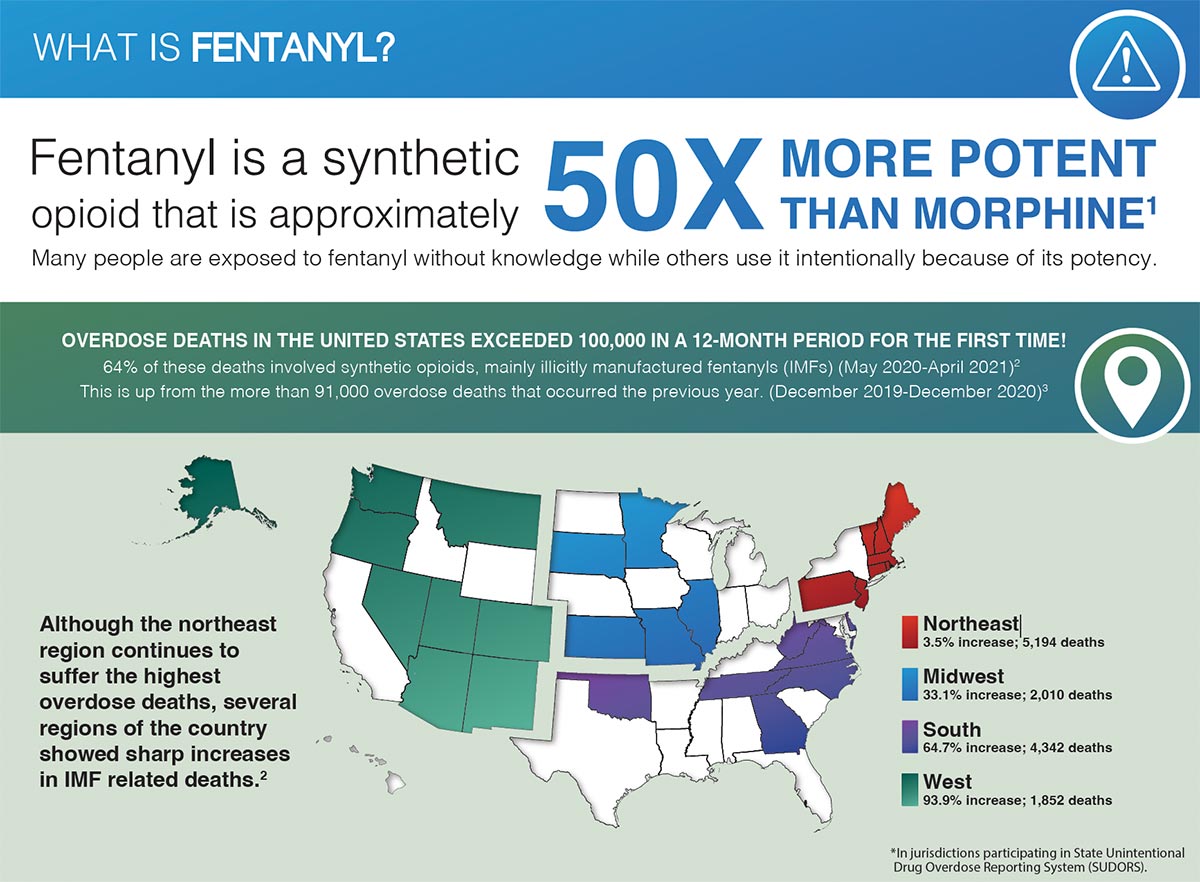What is Fentanyl?
Fentanyl is a potent synthetic opioid.
- Potent: up to 50x stronger than heroin and 100x stronger than morphine. A few grains of sand worth can be lethal.
- Synthetic: Not plant-based. It is made in a lab.
- Opioids: Opioids are substances that act on opioid receptors to produce morphine-like effects. Medically, they are primarily used for pain relief, including anesthesia.
Rapid teen overdose increases.
Illegally made Fentanyl is the primary driver of the recent increase in all us overdose deaths. Fentanyl-involved deaths are the fastest growing among 14-23-year-olds. Fentanyl is involved in more deaths among people under 50 than any other cause of death, including accidents, heart disease, and cancer. Among teens, deaths related to Fentanyl have tripled in the past two years. However, 73% of teens say that have not heard of Fentanyl before.

Fentanyl is everywhere
An estimated 250-500 million pills made with Fentanyl are in circulation in the U.S. at any time. This number doesn’t account for powder drugs made with Fentanyl such as cocaine, MDMA (molly/ecstasy), or heroin.
Why is it everywhere?
Fentanyl is very cheap and extremely addictive. Because of this, drug dealers are mixing illegally made Fentanyl with and disguising it as other common drugs like Oxycontin, Percocet, and Xanax to increase profits. Drug users have no way of knowing what they are getting in illegally purchased drugs, and as little as two milligrams of Fentanyl (two grains of sand) can kill a person. The practice of cutting drugs with Fentanyl is relatively new, so public awareness is low. Educating the public about this crisis is the first step to reversing the tragic outcomes.
How to talk to your teen about Fentanyl
Talking to a teenager about substance use can be awkward, and run the risk of pushing your teen away. Here are some ways you can set up the conversation in order to prioritize sharing honest information while maintaining respect and connection. In this blog, on how to talk to your teen about drugs, we break this down in more detail.
- Share fact-based articles with your teen. Provide straightforward and informative evidence.
- Offer your thoughts and opinions about drug experimentation and substance use + abuse.
- Draw a hard line with your teen without becoming angry. Anger, shouting. Lecturing or ranting hurts your teen.
- Parents have an obligation to take care of themselves, so communicate your limits to your teen directly. If drugs are in the home, parents are an accessory to the crime. It is often effective to let your teen know that if necessary, you will call the police and grant them permission to search the premises.
- State these realities in a matter-of-fact and loving way. They need to know that you love them and do not want to live with the guilt of them or their friends dying from an overdose if there was a chance to intervene.
- Statements about yourself and not being an accessory are more effective than lecturing teens.
- Girls, in particular, need to know about the effects of drugs during the first trimester of pregnancy.
If you are considering drug use, use caution:
- Test your product. Test strips are available so you can see if your drugs contain Fentanyl. Caution: There is no such thing as a pill that has been tested for Fentanyl since the test requires that you fully dissolve each and every entire pill in water. Test strips also do not test for every Fentanyl analog.
- Carry naloxone: Some cities and states are making naloxone available. Find naloxone near you and get trained to administer it.
- Know the signs of an overdose: Loss of consciousness, unresponsiveness, irregular breathing, and inability to speak are a few of the signs to look out for.
- Be prepared to call for help: If you witness someone experiencing the symptoms of an overdose, call 911 and request emergency medical services. 47 states and D.C. have enacted Good Samaritan laws, which provide immunity to those who call emergency services when experiencing or witnessing an overdose.
Signs your teen may be using drugs
If you are worried your teen may be using substances, look out for the following signs.
- Sudden worsening of school grades
- Sudden friendship changes
- Sometimes drug abusers have mood and attitude changes for no apparent reason.
- Parents, know your stuff. Marijuana gives you red eyes, mushrooms expand your pupils, and opiates shrink your pupils or “pin” your eyes.
- Highs are often followed by depressive lows.
- Changes in sleep habits
- Isolation and constant drowsiness
What to do when you suspect your teen is using drugs
- Remain calm. Do whatever you need to do to settle your nervous system. Call a friend, go on a walk, etc.
- Talk it over with your teen. Confront your teen directly. Let them know what you found or that you’re worried. Let them know you are still thinking about how you want to address it.
- Talk with your teen’s school counselor.
- Find out if your teen’s friends or siblings are concerned about them. (This isn’t about getting them to “rat” your teen out. It’s about getting a gauge of how destructive the behavior is.)
- Get professional support.
Antelope Recovery can help
Understanding the dangers and prevalence of Fentanyl is essential for parents and caregivers in today’s world. We’ve delved into the characteristics of this potent substance and the reasons behind its increasing availability. Equally important is recognizing the signs of teen drug use and knowing how to approach the conversation with your teenager. If you suspect your teen may be using drugs, seeking help is a vital step in ensuring their safety and well-being. Antelope Recovery is here to provide support, resources, and guidance for families facing these challenges. We believe that open communication and professional assistance are key to addressing the presence of Fentanyl and other dangerous substances in our communities, ultimately helping teenagers make healthier choices and protecting their futures.


